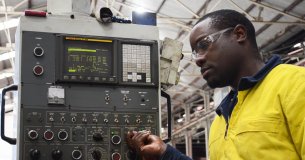-
Featured Items
-
Featured Resources
 Funding & Grants
Don't miss out on funding opportunities. Stay informed with our up to date online listings and email notifications.
Read More
Funding & Grants
Don't miss out on funding opportunities. Stay informed with our up to date online listings and email notifications.
Read More
 Skilled Migration
Our services help both applicants and employers, to learn more, develop plans, submit applications, and settle in.
Read More
Skilled Migration
Our services help both applicants and employers, to learn more, develop plans, submit applications, and settle in.
Read More
 Research and Analysis
Good research and analysis makes the case. How can our resources and services help your project or application?
Read More
Research and Analysis
Good research and analysis makes the case. How can our resources and services help your project or application?
Read More
 Information & Data Resources
With resources like REMPLAN, Regional Knowledge Base, and decades of data, discover how we can help your project.
Read More
Information & Data Resources
With resources like REMPLAN, Regional Knowledge Base, and decades of data, discover how we can help your project.
Read More
-
Stay InformedSubscribe to one or more of our regular email subscriptions, to be kept up to date on news and funding opportunities for the region
-
-
Our Region
- Our Region
- Regional Plan
- Regional Data
- Current Regional Issues
- Population Migration Analysis for 2016-21
- Job Vacancies Continue at All-Time High
- National Debt - What it Means for Our Economy?
- The True Value of Home Solar
- The Economic Impacts of Local Government Amalgamations
- State of the Regions Report 2014-15
- Antifragility - A different take on regional economic development
- Biohubs - Collaborative Waste Management
- Attracting New Residents
- Socio-Economic Impacts of the Murray Darling Basin Plan
- Murray Darling Basin Water Recovery
- Growing Businesses
- The Northern Inland Economy
- Geographical Overview
- Major Industry Sections
- Our Services
- Grants and Funding
-
Skilled Migration
- Skilled Migration
- Skilled Employer Sponsored Regional Visa
- Skilled Work Regional Visa (subclass 491)
- Temporary Seasonal Workers
- Designated Area Migration Agreement (DAMA)
- Helpful Information for Visa Holders
- Information for Employers
- Case Studies
- Payment Details
- Advice & Further Information
- Contact Details
- News & Events
-
Our Projects
- Our Projects
- Current Projects
- Skilled Migration
- Wool Works - Wool Training Schools
- Metal Works - Welding and Fabrication Schools
- Come On Inland
- Stories of Resilience
- Alt Brothers Beekeeping - Glen Innes
- Carelle's Toy Store - Glen Innes
- Greenhill Orchards - Arding
- Gwydir Meats - Warialda
- Kaputar Motors - Narrabri
- Moonbi General Store - Moonbi
- Sandstock - Tingha
- Sherelle Fashions - Tenterfield
- Sleepy Merino - Inverell
- Tenterfield Chamber of Toursim, Industry and Business - Tenterfeild
- The Welders Dog - Armidale
- Walcha Veterinary Supplies - Walcha
- AGCAP - Agribusiness Careers & Professions
- Northern Inland Regional Investment Profile
- Past Projects
- Digital Economy Strategy
- Business Growth Project
- Go Digital
- How to Start an Online Business
- Create Your Website Using Squarespace
- How to Edit Your Squarespace Site - Part 1
- How to Edit Your Squarespace Site Part 2
- Add a Shop to Your Squarespace Site
- Start a Blog and Find out What Customers are Searching
- 14 Tips For a Better Blog Post
- Which Social Media Platforms are Best for Your Business
- How to Use Facebook Effectively For Your Business – Part 1
- How to Use Facebook Effectively For Your Business – Part 2
- Instagram Tips for Business
- Catching Up, More Instagram & Dealing with Haters
- Getting Started with Twitter for Business
- Social Media Scheduling Tools
- How to Start an Etsy Shop – Part 1 – Research
- How to Start an Etsy Shop – Part 2 – Signup
- Online Security for Your Business
- Product Photography and Website Images: Your Guide
- 5 Tips to Improve your Productivity in your Business
- Best Online Business Resources
- How to Improve Your Communication Skills and Win More Clients
- NBN Coordinator
- Putting Power Back in the Regions
- Road Freight Study
- Town Audit Benchmarks
- Food and Wine
- Youth Survey
- Digital TV Switchover Assistance
- Northern Inland Transport Guide
- Live.Train.Work
- Northern Inland Innovation Awards
- Northern Inland Innovation Awards - 2017
- Northern Inland Innovation Awards - 2016
- Northern Inland Innovation Awards - 2015
- Northern Inland Innovation Awards - 2014
- Northern Inland Innovation Awards - 2013
- Northern Inland Innovation Awards - 2012
- Norther Inland Innovation Awards - 2011
- Prime Super Northern Inland Innovation Awards - 2010
- Prime Super Northern Inland Innovation Awards - 2009
- Northern Inland Innovation Awards - 2007
- Northern Lights Project
- NBN Smart Home
- Murray Darling Basin
- Moree Plains Business Workshops
- Namoi Investment Prospectus
- Industrial Land
- Bioenergy and Local Electricity Retailing
- Northern Inland Business Energy Assessment
- Skills for the Future
- Impacts of COVID-19 on Businesses
- Past Projects of NIRDB
- Aboriginal Employment and Enterprise in the Gunnedah Region
- Art as an Industry
- Aviation Survey
- Farm Forestry - Northern Inland Forestry Investment Group
- New England North West Film Strategy
- Northern Inland Excellence in Business Awards
- Food and Wine 2003 - 2008
- Prime Super Northern Inland Innovation Awards 2009
- Regional Business Networking Program
- Regional Leadership Course 2008
- Viticulture Strategy 2002-2003
- About Us
- Contact Us
- Other Resources
- Privacy and Legal
- Search
- News & EventsNews & Events
- NewslettersNewsletters
- Survey Quantifies Northern Inland Skill ShortagesSurvey Quantifies…
Back to Newsletters

Survey Quantifies Northern Inland Skill Shortages
Wednesday 24th of October 2018

Regional Development Australia Northern Inland (RDANI) Senior Project Officer David Thompson, Finance and Project Officer Rebecca Wright and Executive Director Nathan Axelsson, with the RDANI Skills for the Future Report.
Regional Development Australia Northern Inland (RDANI) has released the findings of its investigation into the skill shortages and other labour challenges in the region. Data now supports what has long been suspected; Northern Inland business growth is being throttled by the difficulty in finding and retaining skilled and experienced employees across many industries throughout the region.
More than 100 employers from throughout Northern Inland NSW participated in the comprehensive online survey over the past 12 months. Results have been collated, conclusions drawn and they are presented in the RDANI ‘Skills for the Future’ report, which the organisation’s Chair, Russell Stewart considers an important resource for working to support the economic development of the region.
“We now have the evidence-base to better target our efforts to address local employers who struggle with labour challenges,” Mr. Stewart said. “Through local knowledge, our Committee and staff had a good understanding of our region’s skill shortages and business growth barriers but now we have facts and figures to underpin the work of Regional Development Australia Northern Inland.”
“Over 80 percent of businesses surveyed reported difficulties in filling job vacancies, while 75 percent said that industry experience is more valued than qualifications, indicating how retention of staff is as critical a challenge as recruitment,” he said.
“In undertaking this survey, our message to businesses was ‘help us to help you’ and we were delighted to hear back from so many different businesses, large and small,” Mr. Stewart said.
From Moree to Armidale, Willow Tree to Tenterfield, the Northern Inland region of NSW is dependent on agriculture as its predominant economic driver and has seen unemployment figures consistently higher than the NSW average over the past six years, with youth unemployment concerns prompting renewed focus on innovative programs, like RDANI’s Wool Works Shearing School. The trend is not expected to abate with the ongoing drought.
Population decline in some parts of the region has exacerbated skill shortages, while a lack of access to formal training and the centralisation of TAFE courses have also reduced the local skilled labour market, impeding business growth. Consistent feedback during RDANI’s skills audit investigations was that finding staff with work readiness or work ethic can be more important to local employers than finding staff with the skills they need and can be an even greater source of frustration.
Executive Director of RDANI Nathan Axelsson said that the Skills for the Future report was a large undertaking that created a resource for the region and it can be accessed online at www.rdani.org.au/skills. “Our staff members, David Thompson and Rebecca Wright did a great job in crunching the numbers and presenting them in a very accessible report,” he said. “It also illustrates the vital role that RDANI’s Skilled Migration programs have in helping to address local labour needs.”
“Skilled Migration is not a silver bullet. It is also important to stem the outward migration of our quality young people and to ensure education, training and job opportunities are available locally. However, the settlement of skilled migrant workers in the Northern Inland is clearly a necessity, despite the recent political and media hype about reducing migration numbers,” he said.
“This survey has provided a localised snapshot of skill shortages and other labour market issues. Issues around job vacancies, skills shortages and youth unemployment are not accurately reflected by job advertisements, which are the traditional source of job and unemployment data. Employers know from past recruitment efforts and local knowledge if advertising for a skilled position will be worth a go or a waste of time and money,” Mr. Axelsson said. “The data we have produced reflects real insights, direct from local employers.”
The employer survey project received funding from the NSW Department of Premier and Cabinet.
Related Pages







 Latest News
Latest News
